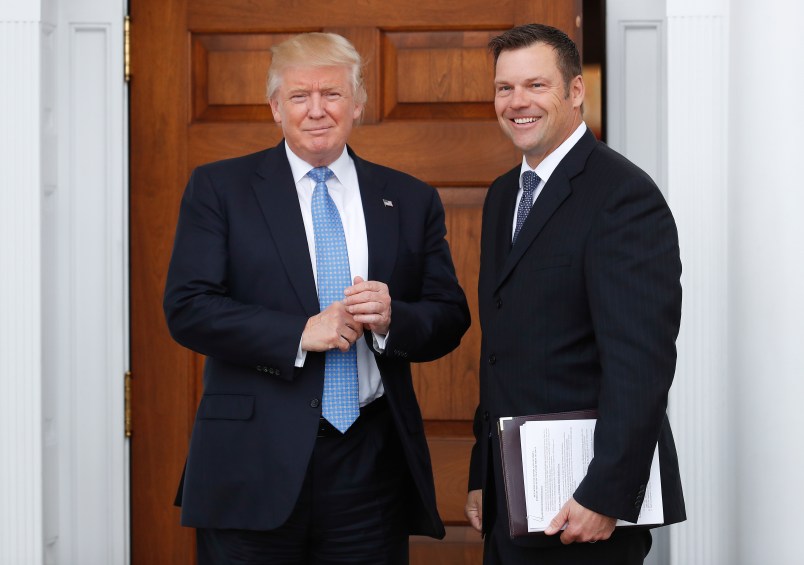Nearly a year after Kansas Secretary of State Kris Kobach (R) was photographed with then-President-elect Donald Trump holding an apparent proposal to weaken a key voter law, court documents have been made public in which Kobach discusses the details of that proposal and what he discussed with Trump.
Kobach, according to excerpts of a depositions in an ACLU lawsuit unsealed Thursday, said the proposal referred to a “yet uncreated amendment” to the National Voting Registration Act (NVRA) and that it was a “conceptual statement.”
“The point is that, it—it doesn’t refer to anything specific. It’s—if there were a future bill to bring the NVRA up to date with the Internet age, this is something that the administration can consider,” Kobach said in the deposition, which he gave in early August.
The deposition was part of an ACLU legal challenge to the proof-of-citizenship voter registration requirement Kobach has been trying to implement in his state. Courts have repeatedly blocked the requirement, in part on claims that it violates the NVRA, the 1993 “Motor Voter” law that streamlined the process to register to vote.
Kobach now also serves as the vice chair of the President’s voter fraud commission, which has come under fire for a lack of transparency. Civil rights advocates fear the commission will be used to push for more restrictive election policies, including a weakening of the NVRA.
Back in November, Kobach brought to a transition team meeting with Trump a “KOBACH STRATEGIC PLAN FOR FIRST 365 DAYS” that included the statement “Draft Amendments to National Voter Registration Act to promote proof-of-citizenship requirements” under a section titled “Stop Aliens From Voting.”
Other documents surfaced in the ACLU litigation show that Kobach had wrote a more detailed proposal to amend the NVRA. That proposal, coincidentally, mirrored the language the ACLU used in a legal brief describing how the NVRA would need to be amended for his proof-of-citizenship requirement to be permissible.
Kobach, in the deposition, denied he had lifted the language from the ACLU.
“I think it is inconceivable that I would have had your brief in my hand when drafting this,” he said to the ACLU attorney deposing him, Dale Ho.
Kobach said he wrote the more detailed proposal in the summer or fall of 2016, before Trump was elected.
“So I could not have possibly drafted this in preparation for a meeting with the President-elect,” he said, adding that, until the litigation, he had only shared it with two Kansas state officials.
That proposal would change NVRA language that limits DMV officials processing voter registrations from asking for more information than what’s required for a driver’s license. It would also explicitly allow proof-of-citizenship requirements.
Kobach did admit that he had discussed amending the NVRA with Iowa Rep. Steve King (R-IA), whom he saw as a potential sponsor if he lost the ACLU case and legislation was needed “to restore the meaning of the NVRA.”
At the November meeting with Trump, Kobach said he didn’t recall discussing his NVRA proposal specifically, but that there was a conversation about “the problem of
noncitizens voting illegally in U.S. elections.”
He was asked to clarify what that meant.
“I mean that noncitizens have regis… have successfully registered and have successfully voted in Kansas, and that I believe this problem extends beyond
Kansas to the other states as well, and that it has the potential to — well, it over- — it effectively nullifies a citizen’s vote every time a noncitizen votes, and it potentially can swing the result of an election if the election is close,” Kobach said.
A week after his November meeting with Kobach, Trump began tweeting false claims about “millions” of illegal voters in the 2016 election.
In addition to winning the Electoral College in a landslide, I won the popular vote if you deduct the millions of people who voted illegally
— Donald J. Trump (@realDonaldTrump) November 27, 2016
Read the deposition excerpts below:










